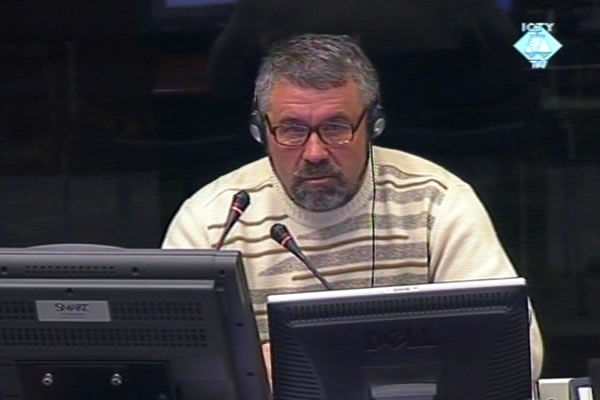Home
KARADZIC AT WAR WITH ‘UN ARMY’
The prosecution continues its case at the trial of Radovan Karadzic with the evidence of two former UN peace-keepers. In May and June 1995, the Bosnian Serb forces detained the two witnesses heard today and held them hostage
 Aleksandr Vishnevski, witness at the Radovan Karadzic trial
Aleksandr Vishnevski, witness at the Radovan Karadzic trial At the trial of former Republika Srpska president Radovan Karadzic the prosecution started calling evidence on the ‘hostage crisis’ which lasted from May to June 1995. The indictment alleges that the Serb forces detained more than 200 members of the UN peace-keeping force and military observers and held them captive in various positions of strategic and military importance to secure the locations against NATO air strikes. Two former UNPROFOR soldiers were heard today: Ukrainian Alexandr Vishnevski and a member of the UNPROFOR French Battalion who testified under the pseudonym KDZ-196.
Vishnevski was disarmed at a Serb check point in Ilidza on 26 May 1995. The explanation he was given was that the Serb forces wanted to protect them from NATO air strikes. The UN soldiers realized they had in fact been taken hostage only when they saw the French ‘blue helmets’ tied to lamp posts. The next day, the witness and 14 other Ukrainian soldiers were taken first to Bijeljina and then to Banja Luka. There, as Vishnevski described, Serb soldiers set dogs on the captured UN soldiers in order to split them into smaller groups and put them in various locations.
Witness KDZ-196 was detained in Poljine where UNPROFOR had established a check point to control the Serb heavy artillery. According to the witness, local Serb commander Vlado Medic was in charge of the operation in which they were arrested. When the French soldiers refused to lay down their arms, a captain by the name of Drago put his knife to the witness’s throat. Another Serb soldier put his Kalashnikov against the witness’s back. After they were disarmed, the captured soldiers were taken to the VRS military hospital in Jagomir, and then to Doboj.
According to the summaries of their written statements admitted into evidence, both witnesses were released on 6 June 1995. In the examination-in chief, the prosecutor dealt with the details of their capture and a number of documents from the Bosnian Serb army showing that the VRS Main Staff was in charge of the operation to arrest UN members.
Karadzic broke all records with the brevity of his cross-examination; he asked both witnesses to confirm whether on the day of their capture they were ‘active duty servicemen in the UN military forces’. As Karadzic noted, in their statements and the documents the prosecution tendered into evidence, the witnesses do not use the term ‘hostages’ but ‘prisoners of war’. It is Karadzic’s case that UNPROFOR in effect became a ‘warring side’ after the French ‘blue helmets’ killed and captured several Serb soldiers in the fighting near the Vrbanja Bridge in Sarajevo on 26 May 1995.
Prosecutor Edgerton had only one additional question for the former French Battalion soldier. The prosecutor asked him to explain the meaning of the term ‘UN military forces’ and in whose ‘active service’ he and other hostages were at the time of their capture. ‘Those are UN peace-keeping troops, the so-called blue helmets’, the Frenchman replied.
A few other former UN peace-keepers are expected to testify before the end of this week. In May 1995, they were used as human shields by the Bosnian Serb army during the NATO air strikes.
Linked Reports
- Case : Karadzic
- 2011-01-20 KARADZIC: CIVILIANS WERE NOT KILLED DELIBERATELY
- 2011-01-19 SUFFOCATING SARAJEVO
- 2011-01-18 ‘PROFITABLE TARGETS’ OF THE SERB ARTILLERY
- 2011-01-26 UN SOLDIERS USED AS HUMAN SHIELDS
- 2011-01-28 UNARMED OBSERVERS AS ‘WARRING SIDE’
- 2011-01-31 KARADZIC DEMANDS PRIVACY PROTECTION
